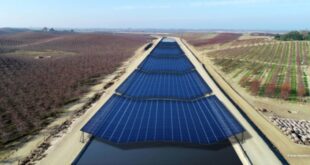A total of $570,000 has been awarded to a dozen recipients—ranging from private businesses, public agencies and universities— for water saving projects by the Innovative Conservation Program (ICP) and six agencies. The agencies and grant funding source are a partnership between the Bureau of Reclamation, the Metropolitan Water District of Southern California, Western Resource Advocates, Southern Nevada Water Authority, Central Arizona Project and Southern California Gas Company.
Awardees were chosen from among 55 proposals evaluated through a competitive review process based on project innovation, research plan, market impact potential and project preparedness. Nine of the 12 grant recipients are located in California.
“Water providers are constantly looking for new and better ways to save water and use it more efficiently,” said Metropolitan Water District’s General Manager Jeffrey Kightlinger. While we foster innovation internally, we’re also counting on startups, entrepreneurs and university researchers to help produce and test the next generation of water-saving devices and technologies.”
Drew Beckwith of Western Resource Advocates expressed similar thoughts saying, “We’re looking for water savings everywhere—inside and outside the home, in agriculture, and across a broad range of industries. We’re in the 18th year of drought in the Colorado River Basin—a key water supply for 40 million people across the Southwest—and there is every indication climate change is only going to make things worse. Every drop counts.”
California grant recipients and their water savings projects include the following:
Aquam Technologies (San Diego, CA) – Brewery wastewater reuse for landscape irrigation
Evaluation of the “BioElectrochemical Sanitation Technology” (BEST) as a modular and low-cost, high-strength industrial wastewater treatment for water reuse.
Advanced Research in Government Operations (Los Angeles, CA) -Project California-Friendly Plant Calculator
Develop an online tool to estimate how much water a homeowner can save by converting to California-friendly plants.
Cal State Northridge (Northridge, CA) -Testing methods to conserve irrigation water
Evaluate the water savings potential of compost and hydrogel in turf grass areas.
Flo Technologies (Culver City, CA) – Real time water use data and leak detection
Evaluate the water savings achieved using “Flo System” a real-time water use monitoring and water shut-off system in single family homes.
Frontier Energy (San Ramon, CA) – Pumped rinse commercial dishwasher
Evaluate the water savings of pumped rinse, high-temperature sanitizing, door-type commercial
dishwasher.
ManageWater (Redwood City, CA) – Detecting water leaks using drone technology
Evaluate the use of drone-acquired thermal imagery in detecting leaks in distribution pipelines.
Pasadena Water and Power (Pasadena, CA) – Innovative financing to increase greywater systems
Analyze financial mechanisms that could drive larger scale adoption of greywater systems.
Rain Systems (Los Angeles, CA) – Precision injection machine
Evaluate the use of a precision injection machine to install hydrogel into turf at root level.
University of California Riverside (Riverside, CA) – Smart irrigation technologies
Develop efficient landscape irrigation management strategies using smart irrigation technologies.
The ICP has awarded 67 grants totaling $2.4 million during six two-year funding cycles since it was initiated in 2001. The program has funded much-needed research into a diversity of water-saving
technologies and devices that have included technologies that cut the water needs of grass, improve the efficiency of drip irrigation, use drones to optimize irrigation on golf courses and improve sensor-based irrigation for vineyards and other crops. Internal water-saving research technologies funded by ICP and its partners– both in the home and in businesses – include using solar power to treat graywater in single-family homes, increasing the water efficiency of various appliances in commercial kitchens and decreasing water use in cooling towers.
More information on the Innovative Conservation Program, including lists of past projects, is available at http://mwdh2o.com/ICP.
 California Water News Daily Your Source For Water News in California
California Water News Daily Your Source For Water News in California


